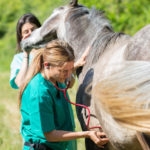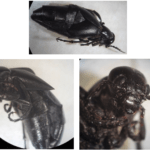Basisphenoid and Basioccipital Bone Fractures in a Horse Randi Gold, VMD, PhD, DACVP A 10-year-old female quarter horse flipped over backwards onto its head after being spooked. Following the incident, the patient made multiple attempts to rise … [Read more...] about Basisphenoid and basioccipital bone fractures in a horse
horse
West Nile virus: Diagnostic Guidance for Veterinarians
Late summer is when the West Nile virus (WNV) poses the greatest threat to the health of horses in the United States. It’s important for veterinarians to educate horse owners concerning the prevention, detection and accurate diagnose of WNV. Yearly, … [Read more...] about West Nile virus: Diagnostic Guidance for Veterinarians
TVMDL adds panel to test catalog to aid in the detection of strangles
The Texas A&M Veterinary Medical Diagnostic Laboratory (TVMDL) now offers a new strangles testing panel to assist equine clients in the detection of strangles. Earlier this year, TVMDL announced the addition of a multiplex real-time polymerase … [Read more...] about TVMDL adds panel to test catalog to aid in the detection of strangles
Collaborative project leads to improved diagnostic detection of strangles
Research initiated at the Equine Infectious Disease Laboratory (EIDL) at Texas A&M University aimed at exploring the genomic components of strangles has now led to an improved assay at the Texas A&M Veterinary Medical Diagnostic Laboratory … [Read more...] about Collaborative project leads to improved diagnostic detection of strangles
West Nile virus guidance for equine practitioners
Late summer is when the West Nile virus (WNV) poses the greatest threat to the health of horses in the United States. It’s important for veterinarians to educate horse owners concerning the prevention, detection and accurate diagnose of WNV. Yearly, … [Read more...] about West Nile virus guidance for equine practitioners
Equine asthma diagnosed with BAL Cytology
Equine asthma diagnosed with BAL Cytology Julie Piccione, DVM, MS, DACVP and Judith Akins, DVM, MS A 23-year-old American Quarter Horse mare was presented to a veterinarian for chronic coughing and exercise intolerance. On physical examination, … [Read more...] about Equine asthma diagnosed with BAL Cytology
Heavy rains increase potential for mosquito-borne diseases
Recently, most of Texas has experienced record-setting rainfall. Flood waters can lead to a multitude of animal health concerns, but as the weather begins to warm up, one concern has the potential to be the most harmful: mosquitos. When it comes … [Read more...] about Heavy rains increase potential for mosquito-borne diseases
Fungal Equine Endometritis
Fungal Equine Endometritis Judith Akins, DVM, MS Vaginal/uterine discharge was submitted to the Texas A&M Veterinary Medical Diagnostic Laboratory (TVMDL) in College Station from an eight-year-old Warmblood mare for culture and a cytologic … [Read more...] about Fungal Equine Endometritis
Review the range: Cattle and horse owners encouraged to be aware of potentially toxic plants
Spring is getting closer and summer is not far behind. As the seasons change, it’s important to be aware of the different plants that have grown or been added to your surroundings and their potential toxic effects on cattle and horses. What are … [Read more...] about Review the range: Cattle and horse owners encouraged to be aware of potentially toxic plants
Gomez contributes to literature over systemic toxoplasmosis in equine
Texas A&M Veterinary Medical Diagnostic Laboratory (TVMDL) Anatomic Pathology Section Head Gabe Gomez, DVM, PhD, DACVP is part of team that recently published an article in the Journal of Comparative Pathology. The article covers systemic … [Read more...] about Gomez contributes to literature over systemic toxoplasmosis in equine
Failed Equine Pre-Purchase Drug Screen
Failed Equine Pre-Purchase Drug Screen Travis Mays, MS, PhD Blood was collected during a routine pre-purchase examination on a horse and submitted to the Texas A&M Veterinary Medical Diagnostic Laboratory (TVMDL) in College Station for drug … [Read more...] about Failed Equine Pre-Purchase Drug Screen
Gopher bait with anticoagulant detected in horses
Gopher bait with anticoagulant detected in horses Guy Sheppard, DVM and Cat Barr, PhD, DABT The Texas A&M Veterinary Medical Diagnostic Laboratory (TVMDL) was contacted by a client who was concerned a group of horses had potentially consumed … [Read more...] about Gopher bait with anticoagulant detected in horses
TVMDL group authors article for Texas Equine Veterinary Association
A group of veterinarians and scientists from the Texas A&M Veterinary Medical Diagnostic Laboratory's (TVMDL) College Station laboratory recently authored an article for the Texas Equine Veterinary Association's (TEVA) publication, The Remuda. … [Read more...] about TVMDL group authors article for Texas Equine Veterinary Association
Quantitating Cantharidin levels in a blister beetle
Quantitating Cantharidin levels in a blister beetle By Cat Barr, PhD, DABT In January, an animal owner in northwestern Washington State contacted the Texas A&M Veterinary Medical Diagnostic Laboratory (TVMDL) regarding possible blister … [Read more...] about Quantitating Cantharidin levels in a blister beetle
Horse Diagnosed with Equine Botryomycosis
Horse Diagnosed with Equine Botryomycosis Kayla Tomaso and Erin Edwards, DVM, MS, DACVP Tissue samples from two ear masses on a 3-year-old American Quarter Horse were submitted to the Texas A&M Veterinary Diagnostic Lab (TVMDL) in College … [Read more...] about Horse Diagnosed with Equine Botryomycosis
Segmental analysis of hair for drug detection in racing horses
Segmental analysis of hair for drug detection in racing horses Travis Mays, MS, PhD The Texas A&M Veterinary Medical Diagnostic Laboratory’s (TVMDL) drug testing laboratory offers a screen for the detection of beta-adrenergic agonist drugs, … [Read more...] about Segmental analysis of hair for drug detection in racing horses
Possible Wilted Maple Poisoning in Mare
Possible Wilted Maple Poisoning in Mare Cat Barr, PhD, DABT A 7-year-old pastured mare suffered an acute onset of hemolytic anemia and hematuria. The blood drawn for analysis was hemolyzed and dark. The mare died about three hours after … [Read more...] about Possible Wilted Maple Poisoning in Mare
Equine Juvenile Ossifying Fibroma
Equine Juvenile Ossifying Fibroma Will Sims, DVM A two-year-old, male, intact Miniature Donkey had a wound on the mandible that was associated with a large firm mass. Radiographs of the lesion showed large osseous spicules emanating from the … [Read more...] about Equine Juvenile Ossifying Fibroma
Nasal Amyloidosis in a Horse
Nasal Amyloidosis in a Horse Andrés de la Concha-Bermejillo, DVM, MS, PhD Punch biopsies of an ulcerated plaque in the nasal mucosa of a male-castrated, 12-year-old, Quarter horse were submitted to the Texas A&M Veterinary Medical Diagnostic … [Read more...] about Nasal Amyloidosis in a Horse
Duodenitis/proximal jejunitis (DPJ) in a horse
Duodenitis/proximal jejunitis (DPJ) in a horse By Andrés de la Concha-Bermejillo, DVM, PhD A 5-year-old Andalusian stallion was presented for necropsy at the Texas A&M Veterinary Medical Diagnostic Laboratory (TVMDL) after being euthanatized … [Read more...] about Duodenitis/proximal jejunitis (DPJ) in a horse
















